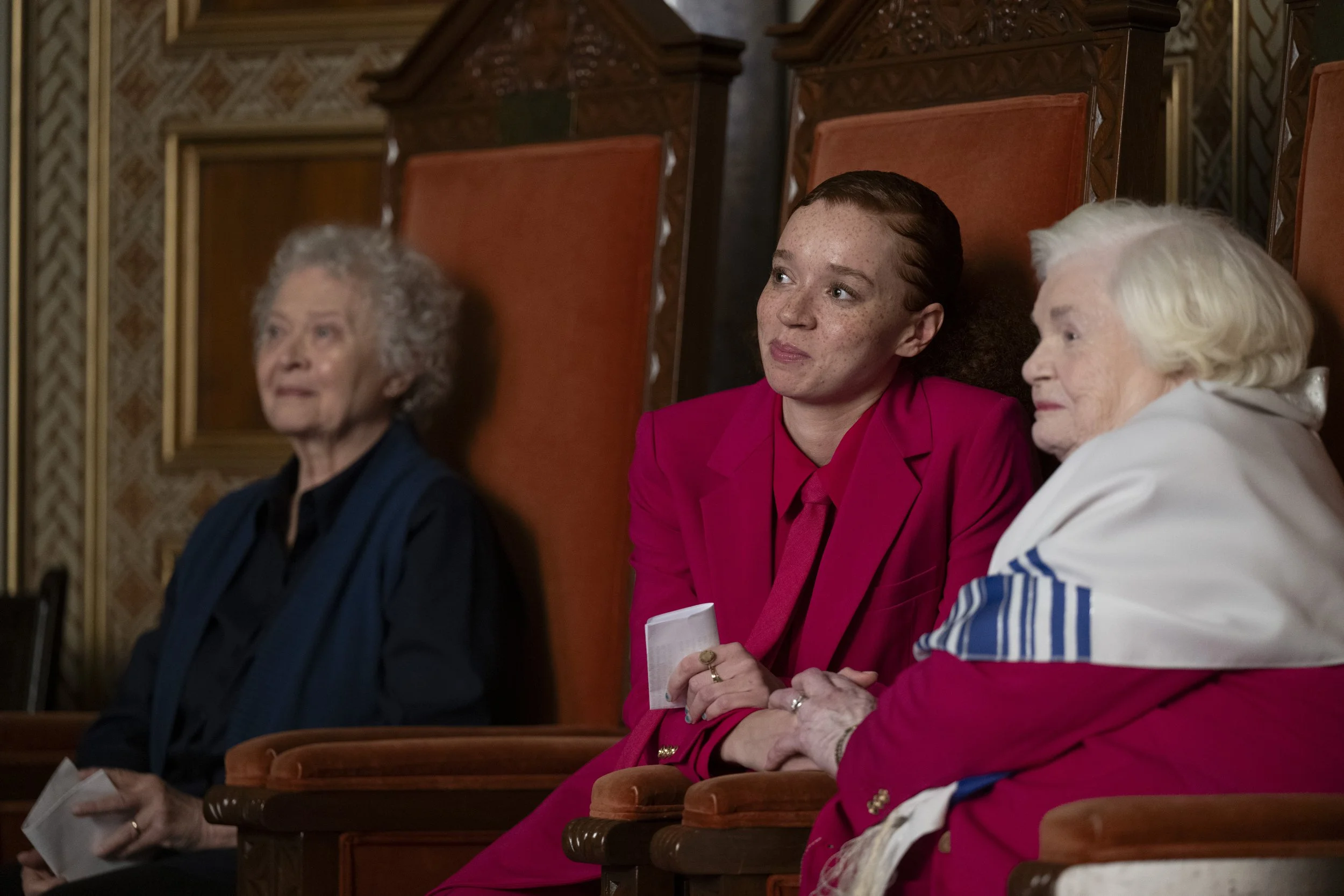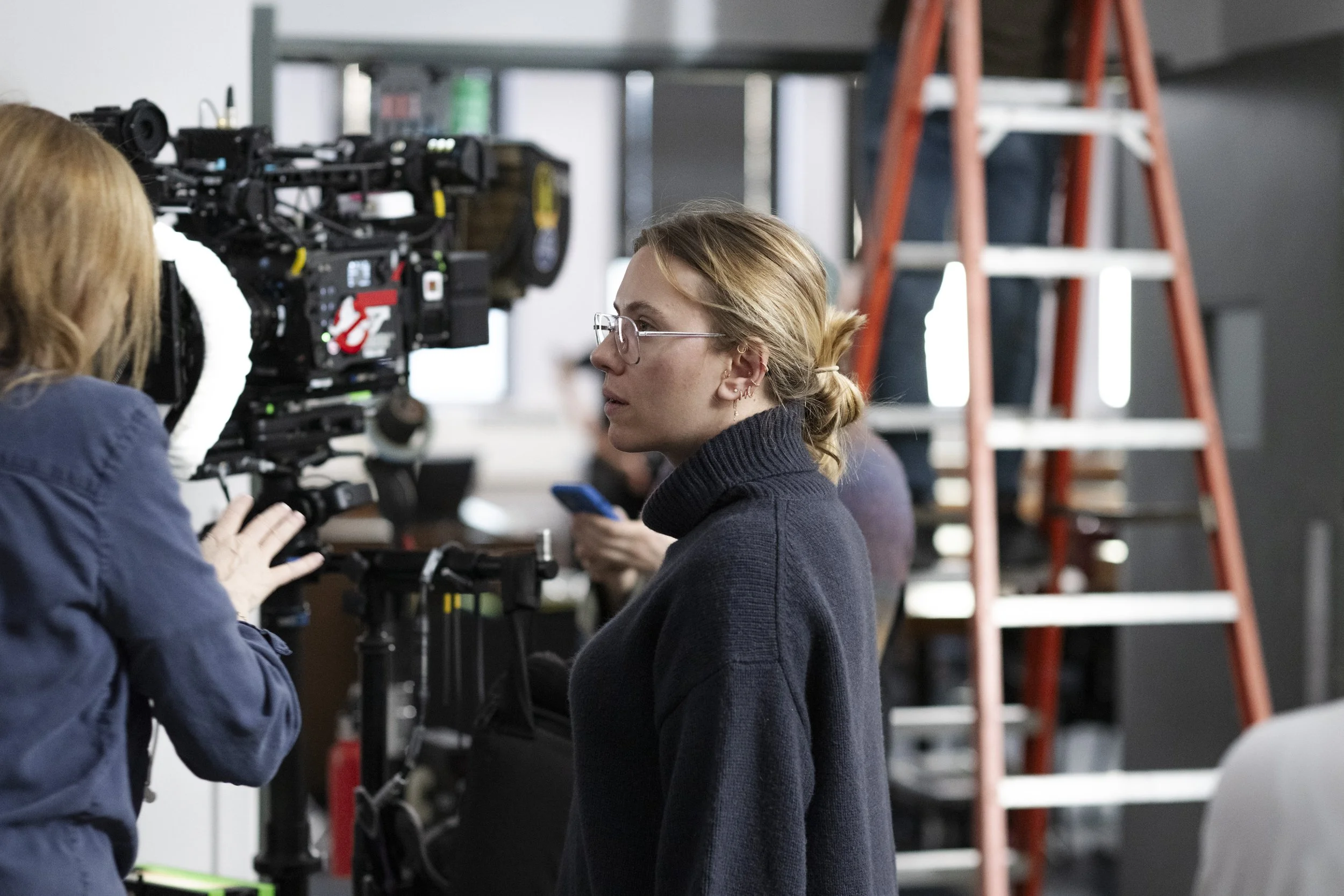Original-Cin Q&A: Scarlett Johansson on Wrangling Grief (and Actors) in Eleanor the Great
By Kim Hughes
Notable for several reasons is the new, New York-set film Eleanor the Great, which made its North American debut earlier this month at the Toronto International Film Festival and which opens wide in cinemas across Canada Friday (Sept. 26).
June Squibb (far right) with Erin Kellyman.
For starters, it’s the directorial debut of Scarlett Johansson, apparently the highest-grossing actor ever — with a reported global box office of approximately $14.8 billion USD. Perhaps more substantively, though, she is an acclaimed performer who has elevated such excellent titles as Marriage Story, Jojo Rabbit, Lost in Translation and Match Point, among dozens of others.
Clearly, Johansson knows a good scene when she sees one. At a press conference for the film during TIFF, she was uniformly described by her cast — June Squibb, Chiwetel Ejiofor, and Erin Kellyman — as a “decisive” director who was “willing to listen.”
Also unique, the film tells the story of a nonagenarian, the Eleanor of the title, who passes herself off as a Holocaust survivor to ingratiate herself with a group that seems uniquely poised to assuage her sadness over recently losing her best friend — an actual Holocaust survivor whose story Eleanor pirates.
It’s striking enough that the story of a 90-year-old is being meaningfully portrayed on screen. Here, it’s being acted by an actual nonagenarian: Squibb, 96 in November, who made her first film appearance at age 61 after decades on stage and has done remarkable work ever since.
In Eleanor the Great, Kellyman plays a journalism student doing a piece on the group that quickly befriends Eleanor and who is coping with her own grief alongside her dad (Ejiofor). Themes of forgiveness, loss, and friendship abound in this tender comedic drama.
Be sure to read our review of Eleanor the Great
In a nondescript conference room at the Royal York Hotel early on a Saturday morning during TIFF, Johansson, Squibb, Ejiofor, and Kellyman sat down with international media (and me!) to discuss the film. Herewith, some select bits from that session. And yes, in case you’re wondering, Johansson is as charming as you’d expect.
On persuasively portraying grief as well as empathy on screen…
SCARLETT JOHANSSON: I think that’s a testament to the cast. You just never know who is grieving or, as someone once said to me, you never know what’s going on in someone’s living room. And it’s true. You never know what people are carrying around with them. But all of us have multiple things going on all the time. Part of you is grieving and part of you is trying to get on with your day. We compartmentalize. The gift of these actors is to have all of that going on in their body language and faces. I’m just watching and making suggestions and adjustments or whatever. That’s my participation in it.
On agism in Hollywood and whether things are improving for women…
JUNE SQUIBB: Yes, I think it is getting better. I just did two films (2024’s Thelma and Eleanor the Great) about 90-year-old women. So, you’re asking me (laughter and applause)? Plus, we now have many leading ladies who are in their 60s and that never happened before. Speaking personally, I love what’s happening for me now. I love my career. I’ve done some great things and some bad things, but I have loved every minute. The thing about being the lead: you have a lot of responsibility, but you also get a lot of the kudos. It all evens out.
On Johansson’s vast experience with marquee directors. Was there a piece of advice or learned methodology she employed here…
JOHANSSON: When I worked with Jon Favreau on Iron Man II, the cast was so stacked! Sam Rockwell, Mickey Rourke, Gwyneth Paltrow, Robert Downey Jr. Very heavyweight actors with very different personalities. I was so curious about how Jon worked with everyone. He said, ‘I’m a therapist in some ways, but I am observing the actors and speaking the language that they respond to and it’s different for each person.’ It wasn’t ‘I am going to direct you my way.’ It was ‘What do you need from me?’ It’s important for actors and directors to understand what’s going to help the other person get the information they need in the moment and to permit the process that allows them to get where they need to go.
On grieving, again, and what the actors learned about it through making this film…
ERIN KELLYMAN: I learned that everybody deals with it differently and there isn’t a correct way to go through anything. In this film with my character and Chiwetel’s character, they butt heads because they’re not giving the other person what they need. That’s doesn’t mean either one is right. You just have to be patient with the process.
Johansson on the Eleanor the Great set
CHIWETEL EJIOFOR: In films like this, you do have to approach it from the inside out, so you do have to look at situations from your own life and draw from those. It comes from a very individual place. There are ways that are potentially more helpful in a family unit but at the same time, it’s a personal journey. But you hope the specifics of it feel familiar to an audience, that they recognize all the different shades of grief.
On whether Johansson hopes to still be working in film in her 90s…
JOHANSSON: Oh, man! I don’t think I have June’s stamina, to tell you the truth. I mean, June made her first film at 61. I was eight. Maybe that’s the key. Plus, I don’t want to eat catering for that many years.




